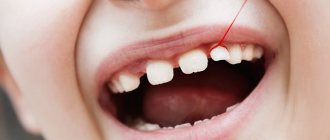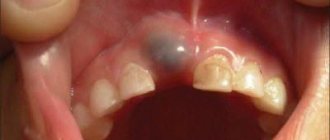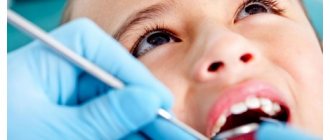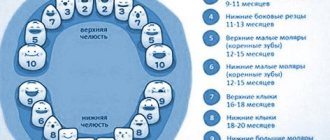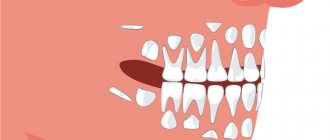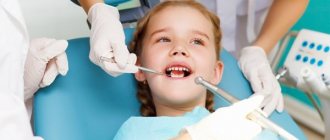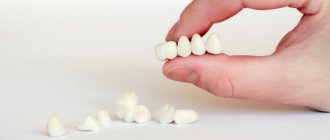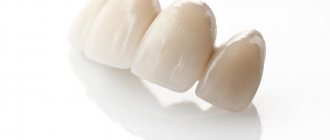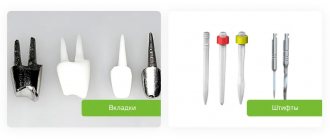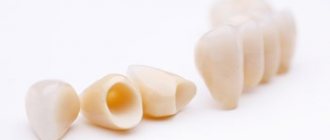Is it possible to put crowns on baby teeth: a review of modern dentures that are suitable even for children
Article navigation
- Do children need crowns?
- Indications for installation
- In what cases should children not be given prosthetics?
- When can it be used
- What types of crowns are there for baby teeth?
- Popular brands of children's crowns
- How is the prosthesis installed?
- How long does the product last?
- How much does it cost to install dentures for baby teeth?
- Crown care
question to a specialist
The fact that baby teeth will “fall out anyway” gives many parents reason to treat their illnesses or removal with disdain – as a temporary nuisance. This is fraught with serious problems in the future, ranging from malocclusion and diction to gastrointestinal diseases. In such cases, prosthetics are indicated for adults, but do children get crowns on their baby teeth, and what types are they? This will be discussed further.
Types of dentures for children
Typically, children are fitted with fixed, removable or conditionally removable dentures. Removable (temporary) dentures are made according to individual jaw impressions, sometimes with additional elements (screws, springs, arches). In children's dental prosthetics, they are installed when several teeth are missing to widen the jaw or correct the position of the teeth, and they must be regularly replaced as the child grows. Fixed dentures are installed for long-term wear and are removed along with the falling out milk teeth.
Do children need crowns?
First of all, dentures for primary teeth perform a protective function. Dentists are often faced with a situation where a small patient is treated repeatedly, because... baby teeth are very soft and inflammation spreads very quickly. As a result, the unit is destroyed anyway, and its remains have to be removed. The use of a crown prevents further infection of the tooth and its loss until it is replaced with a permanent one.
Why else do children get crowns?
- crowns prevent underdevelopment of the jaw bone tissue, which can be observed due to long-term lack of load on the bone,
- ensure normal eruption of permanent units - when one element is removed along with the root, the neighboring ones are displaced, as a result of which the new one may not have enough space (it begins to grow to the side or becomes impacted, i.e. does not show up at all),
- are the prevention of many gastrointestinal diseases, as they ensure normal chewing, and therefore digestion of food,
- ensure correct tongue positioning (the child feels the dentition) and normal speech quality.
Why choose prosthetics at Aza&Buka dentistry
Dental prosthetics for children is a responsible dental procedure. The doctor must take into account many points - characteristics of the bite, growth rates, the presence or absence of certain diagnoses. The prosthetic structure should grow with the child, be comfortable to wear and not interfere with the harmonious development of the patient.
At Aza&Buka, special attention is paid to the safety and quality of dental procedures. Prosthetics in pediatric dentistry is:
- Fast and comfortable. The doctor will conduct a diagnosis immediately during the appointment and select the optimal prosthetic option.
- Complex work of specialists. If necessary, the child will be examined by an orthodontist, a dental therapist, or a dental surgeon. The best decision for the patient will be made.
- Painless at every stage. For especially young children or complex patients, prosthetics will be performed under general anesthesia or deep sedation.
- High quality result. A crown will completely replace a damaged or missing tooth - aesthetically, anatomically, functionally.
- Modern equipment, best brands. Young patients will be offered ready-made dentures or crowns made from acrylic, nylon, ceramics, metal, and zirconium dioxide.
At Aza&Buka dentistry, we provide prosthetics for permanent and baby teeth for patients of any age.
Indications for installation
Indications for restoring baby teeth with crowns are:
- destruction of a unit of dentition by more than half,
- underdevelopment of the enamel layer,
- trauma accompanied by damage to the coronal part,
- frequent loss of fillings, inability to fix them,
- enamel instability to mechanical stress, abrasion.
Installation of the product on baby teeth may also be required in orthodontics - as a support for the orthodontic apparatus (in older children).
Prevention of dental prosthetics in children
Premature loss of baby teeth, and therefore dental prosthetics in children, can be avoided if you promptly and regularly visit a dentist who diagnoses the condition of the teeth, identifies possible bite defects and diseases of the oral cavity. Proper dental care and attendance at preventive examinations will eliminate the problem at the initial stage, avoid tooth loss and the need for prosthetics. The child’s nutrition also plays an important role in the preservation of baby teeth. After all, if there is a lack of substances necessary for a growing body, teeth are destroyed on their own, without mechanical impact on them. Currently, with busy parents and unfavorable environmental and economic factors, the condition of children’s teeth is worsening every day and prosthetics of baby teeth is becoming increasingly important. Therefore, preventive measures should be taken to maintain dental health from an early age.
In what cases should children not be given prosthetics?
Almost all children can get crowns. The only contraindication is increased sensitivity to the materials used for their manufacture, but such situations are extremely rare. And, of course, age - it is permissible to install prostheses for children aged 2-3 years and older (earlier - unless there are very serious pathologies).
In addition, a specialist will not install a denture for a child if the process of root resorption has already affected 50% of the tissue. This phenomenon begins about a couple of years before the tooth falls out on its own, so installing a crown is pointless.
Progress of prosthetics
Regardless of the type of prosthetic structure, the procedure includes the following steps:
- examination, consultation;
- diagnostics - conduct a survey, examine the child (take an x-ray);
- preparation for fixation of the prosthesis. If necessary, treat the tooth;
- taking impressions;
- product production;
- fitting and installation of the prosthesis.
Before fixing any type of product, general preparation of the unit is required - organizing professional cleaning of the enamel layer.
When can it be used
Children's crowns can be placed starting from the age of 2. Sometimes there are situations in which a specialist installs the structure earlier, for example, with congenital hypoplasia of the enamel layer. Each clinical case requires an individual approach, and determining the indications is within the competence of the doctor.
DENTAL PROSTHESIS ON 4 IMPLANTS - from RUR 170,000.
The price includes all procedures for installing Osstem implants (South Korea), including anesthesia and diagnostics.
Hurry up to sign up for a free consultation and fix your prices.
Call now or request a call
Opening hours: 24 hours a day - seven days a week
Prices for dental prosthetics for children
The cost of prosthetics for primary teeth depends on the category of the clinic, the qualifications of the specialist, the amount of work of the dental technician and the material from which the prosthesis will be made. Moreover, the initial consultation with a pediatric dentist in most clinics is free.
| Type of prosthesis | Price |
| Removable denture made of acrylic | from 12,000 rubles |
| Bridge prosthesis | from 25,000 rubles |
| Clasp denture | from 30,000 rubles |
| Quadrotti removable denture without palate | about 32,000 rubles |
What types of crowns are there for baby teeth?
Crowns for children are produced in several types: metal, particularly durable, intended for the chewing group, metal with ceramic coating, plastic, all-ceramic, as well as strip crowns - caps of natural shades, which are installed mainly on the front teeth. As a rule, products are mass-produced and sold ready for use. But dentists also resort to making children’s dentures on their own, but they, of course, cost more than template models.
The peculiarity of materials for baby teeth is their plasticity and reliability of fixation, because the child’s teeth are in the growth stage - it is very important to install the prosthesis in such a way that it does not disrupt this process, so that it does not damage the germ of a permanent tooth, and so that it does not fly off at a crucial moment .
Metal products
Metal crowns for baby teeth come in different sizes and shapes, and they are installed in just one appointment. Despite the numerous advantages that the procedure provides, metal products have disadvantages. For example, there is a risk of developing an allergic reaction to the components included in the material (most often, nickel). In addition, when installed on the front units, such products do not look aesthetically pleasing. Therefore, metal crowns are most often used when teeth in the chewing group are damaged. An important disadvantage of metal is also that it is very hard, so it is not recommended to use it - it disables the antagonist teeth that are located on the opposite jaw.
Strip dentures (strip crowns)
Strip crowns are considered the most effective and simple way to preserve dental units in children. It is based on the use of acrylic and light-curing materials. This is a kind of celluloid cap; Available in sets of 16 pieces of various sizes.
Strip crowns are installed mainly on the anterior group. The products make it possible to preserve units of the dentition in case of pathologies of the enamel layer, injuries, carious destruction, and developmental defects. Their difference from crowns is that after the composite material has hardened, the cap is removed.
Ceramic products
These are standard ceramic crowns, which are also placed on children. But these are quite expensive products, especially considering that they should only last a few years. Such prostheses are created strictly individually in a laboratory.
Classic plastic
This is one of the most popular options - inexpensive, aesthetically pleasing and fast. Such crowns cope quite successfully with their functions and are created in a laboratory in just a couple of hours. They do not last long, but this is just optimal - they are quite enough to preserve the function of the entire jaw apparatus for the period until the permanent tooth grows.
Features of dental prosthetics in children
Children's dental prosthetics has its own nuances. Firstly, in adults the jaw is formed, while the child is growing all the time, and the dentist must do everything possible to ensure that the prosthetics of baby teeth does not disrupt the development processes in the body. Therefore, dentures for children must be hypoallergenic, safe, comfortable, and resistant to chemicals. Therefore, for the manufacture of children's dentures, materials such as acrylic, chrome-plated steel, stainless steel, silver and tin alloys are used. Secondly, children's structures should not interfere with jaw development.
According to their purpose, dentures for children are divided into the following groups:
- therapeutic – restore functions and correct the structure of teeth;
- preventive – prevent deformations and pathologies in the development of teeth and jaws;
- fixing – used for fastening orthodontic appliances and therapeutic materials.
Interesting fact!
Hippocrates called children's teeth milk teeth. He was convinced that the first set of human teeth developed from the milk that infants fed.
Popular brands of children's crowns
The range of children's crowns cannot be called wide. At the moment, the most widely used products are from two manufacturers:
- NuSmile – are highly aesthetic, durable, and hypoallergenic. Products of this brand are popular not only in pediatric dentistry, but also in adult dentistry. The structures are made of metal and covered with ceramics,
- 3M ESPE DENTAL - the company presents both crowns and caps (strip dentures). For production, the manufacturer uses special alloys that are biologically compatible with living tissue. In pediatric dentistry, nickel-chrome products are installed on the chewing group, and zirconium ceramics are installed on the anterior units of the dentition.
“When the child damaged his front teeth, I didn’t know whether it was possible to get crowns or whether they would have to be removed. It’s good that the doctor himself suggested it. White, smooth, like your own. Now the child is happy, and I am calm.”
Valentina R., from a review from babyblog.ru
How is the prosthesis installed?
In general terms, the procedure can be described in the following steps:
- pain relief with individually selected means,
- cleaning the tooth surface from deposits,
- removing a thin layer of tissue from the chewing surface (but not much to preserve the integrity of the tooth),
- selection and fitting of the crown / or taking impressions if a laboratory manufacturing method is used,
- fixation of the crown with a permanent composition,
- sanding and adjustment if necessary.
The duration of the procedure is about half an hour - because the child will not be able to sit longer. That is why template models of crowns are most often used, which doctors have in stock for all occasions (meaning, for all types and sizes of teeth). If necessary, before installation, the doctor carries out treatment - removal of caries or even a nerve, if required.
How to care for children's teeth after dentures?
First of all, you need to thoroughly brush your teeth twice a day - after breakfast and dinner. The area around the crown should be cleaned carefully so as not to injure the gums. The main thing is to prevent the formation of soft plaque, as it can lead to gum inflammation. If your gums still become inflamed, contact the clinic without delay.
In the first 3-5 days after installing a crown on a child’s teeth, the following should be excluded from his diet:
- hard food
- sour foods (including freshly squeezed juices)
- hot food and drink
Why should you entrust your child’s teeth to us?
- The clinics of the Polident network have children's departments, which employ only experienced specialists in children's and adolescent teeth.
- Children's departments are equipped with the most modern equipment and materials for safe and high-quality dental treatment for your child.
- Under conditions similar to premium clinics, our prices are significantly lower.
- And the cost of all services is absolutely transparent and does not change during treatment.
Stock
How long does the product last?
A crown remains on temporary teeth until they fall out. To keep the tissue condition under control, you will need to visit the dentist 2 times a year. They have absolutely no effect on the change in bite and fall out along with the tooth, because they are fixed very securely.
Complex on 4 OSSTEM implants with delayed loading - from RUB 170,000.
Complex implantation Osstem (South Korea) with delayed loading after 4-6 months.
Guarantee for the doctor’s work - unlimited Call now or order a call
Opening hours: 24 hours a day - seven days a week
Crown care
Diet and regular, proper oral hygiene are very important here. It is necessary to avoid hard foods that can lead to chipping of the crown - it is important to exclude crackers, dryers, and candies. If possible, it is also necessary to protect children from injuries and from bad habits of gnawing on everything. Yes, it will be difficult, but this is exactly what will allow you to keep your teeth with crowns safe and sound.
Author: Mikhailova (. M. (Thank you for your help in writing the article and the information provided)
